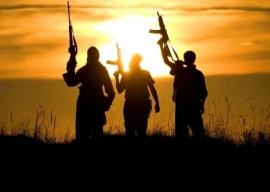
Prime Minister Nawaz Sharif on Wednesday announced a compensation package for thousands of families affected by Monday’s devastating earthquake that hit Khyber-Pakhtunkhwa the hardest.
Meanwhile, digging through the rubble of the monstrous earthquake less than three months after being ravaged by a massive deluge, residents of Chitral, one of the worst-affected districts, cannot afford to wait for government help. With temperatures already plunging as winter fast approaches, there is no time to delay.
The premier, who flew in to K-P to assess the damages, told journalists at the Governor House in Peshawar that a special compensation package was put together in consultation with the provincial government. Under the package, the family of each deceased would be provided Rs600,000; each injured who was maimed or disabled would receive Rs200,000, while the rest of the injured would get Rs100,000 each.
Premier Nawaz also announced Rs200,000 for the owner of every destroyed house and Rs100,000 each for those whose houses were damaged. “Aid can never compensate a human life, nor could it be an alternative to the damages, but it helps reduce the sufferings,” he added.
The 7.5-magnitude earthquake centred in the Hindu Kush – the 800km mountain range that stretches between central Afghanistan and northern Pakistan – caused loss of lives and properties in the two countries and sent shockwaves as far as New Delhi.
Compensation cheques would be distributed from November 2 to 5, he said, adding that local bank cheques would be issued and special counters set up to facilitate the recipients.
The premier gave an assurance that top district administrators would complete the assessment of compensation cases at the earliest. A committee comprising local representatives and Pakistan Army officials would verify every case and complete the process within hours.
Premier Nawaz said 50 per cent of the compensation money would be provided by the federal government while the K-P government would pitch in the other half. As for the affected people in FATA, the federal government would pay for the entire compensation package. However, the provincial government may pitch in if it wants to.
The premier lauded the efforts of the Pakistan Army, the National Disaster Management Authority (NDMA), K-P’s Provincial Disaster Management Authority (PDMA) and the rescue bodies for their prompt response to the disaster.
“The provincial government and all the political parties are on the same page with the federal government,” said Nawaz. “This is not the time for point-scoring. Everyone must join hands to help the affected people.”
He said the federal and provincial governments belonged to different political parties, but they were working together beyond their differences.
Fending for themselves
Sleeping under the sky at night and relying on food from neighbours, Chitral residents are helping each other to rebuild in the wake of the powerful tremor. “Children are forced to sleep under the open sky in the cold weather,” said Kesu village resident Islahuddin. “But nobody has arrived to help them.”
“We won’t wait for the authorities to come [and help us],” said 29-year-old driver Lal Jan. “People here are helping each other... people whose houses survived in the quake provide food and shelter to those who are affected. We all are helping each other to clear rubble from our houses.”
“The local government started its survey to assess damage only yesterday, and nothing else. People are trying to help themselves recover,” said local councillor Jamshed Alam. “Many people, whose houses were destroyed or became too risky to live in, sleep under the open sky at night. They have nothing to cook and eat and are relying on the food provided by neighbours and fellow villagers.”
Meanwhile, relief agencies have been battling to reach cold and hungry survivors of the devastating earthquake, with entire communities still cut off in the mountainous region.
Desperate victims appealed for aid after the quake ripped through the region, destroying houses, triggering landslides and stampedes, and knocking out communication lines.
Rescuers and the military are now in a race against time to reach victims stranded in remote regions before the freezing weather conditions claim more lives.
“We lost everything. We could not save anything,” said a Shangla resident, 60-year-old Hakim Khan, adding that the only thing they had been able to retrieve from the rubble was the body of a dead boy.
Rescue and relief operations
Army relief and rescue efforts continued in the quake-hit areas of Bajaur, Chitral, Shangla and along Karakoram Highway on Wednesday. According to the ISPR, overall 42 relief camps have been set up including 30 distribution points. Around 25 tons of ration, 3765 tents, 37000 food packets, 2000 blankets, and five tons of medicines have been distributed. Some 1,735 patients were treated while 49 water filtration plants have been established for clean drinking water.
Separately, on the instructions of the Punjab chief minister, the PDMA has so far sent 95 truckloads of relief goods to K-P, including blankets, tents, food hampers and flour. A spokesman of the PDMA Punjab said the government had sent 20,000 tents, 20,000 blankets and 20,000 food hampers besides 25,500 flour bags had also been dispatched.
Published in The Express Tribune, October 29th, 2015.
1719660634-1/BeFunky-collage-nicole-(1)1719660634-1-405x300.webp)

1732276540-0/kim-(10)1732276540-0-165x106.webp)

1732274008-0/Ariana-Grande-and-Kristin-Chenoweth-(1)1732274008-0-165x106.webp)


1724249382-0/Untitled-(640-x-480-px)1724249382-0-270x192.webp)


1732270499-0/Express-Tribune-(7)1732270499-0-270x192.webp)






COMMENTS
Comments are moderated and generally will be posted if they are on-topic and not abusive.
For more information, please see our Comments FAQ